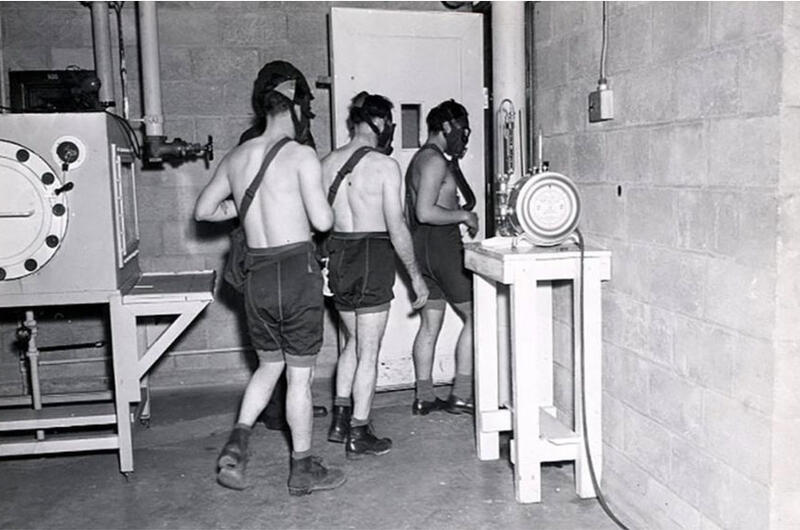Vietnam-era veterans given hallucinogens in secret experiments face VA denials for back pay

Test subjects in an undated photo enter a chamber where they were exposed to chemical agents as part of military experiments at Edgewood Arsenal in Maryland.
By Linda F. Hersey | Stars and Stripes August 12, 2025
WASHINGTON — Veterans injured in secret military experiments that tested hallucinogens and nerve gas on young troops more than 50 years ago said their renewed appeals for retroactive disability benefits are being denied, though a federal court directed the payouts.
The veterans are counting on a 2023 federal court decision granting full benefits to 75-year-old Army veteran Bob Taylor over injuries from the classified military experiments to bolster their own claims for disability compensation dating back to their discharges in the 1960s and 1970s.
The U.S. Court of Appeals for the Federal Circuit in Washington, D.C., instructed the Department of Veterans Affairs to reexamine other claims of lifelong physical and psychological problems connected to the Army experiments at Edgewood Arsenal in Maryland.
The claims of illness and injuries range from severe post-traumatic stress disorder and memory loss to hypertension and cancer.
“This has been going on for 60 years now. It’s time for them [the VA] to pay up. I have these daily intrusive thoughts. They’re like nightmares but I’m wide awake,” said Army veteran Dave Dufrane, 79, of Florida, who was given injections of nerve agents as an 18-year-old private first class.
But the VA this year rejected additional claims as more Edgewood veterans stepped forward to initiate actions for retroactive disability payments. The compensation at a rate of 100% would result in six-figure payouts, the veterans said.
Nearly 8,000 soldiers served as human test subjects in the classified studies the U.S. Army Chemical Corps conducted at Edgewood Arsenal. Though participation was voluntary, the veterans said they thought they would be testing military equipment.
All of the veterans denied had filed earlier claims — some decades old, said Mark Jones, who is the lawyer representing 15 Edgewood veterans.
“The VA continues to do everything possible to deny these veterans an earlier effective date,” said Jones, who estimates fewer than 3,000 Edgewood veterans are alive.
The veterans were unwitting test subjects in experiments that involved administering hallucinogenic drugs and nerve agents, according to court documents.
“I never knew what I was given in those tests,” said Frank Rochelle, 77, of North Carolina, a former Army corporal whose service from 1968-1970 included a tour in Vietnam. The drugs were identified only by numbers.
The chemical substances were delivered in gas chambers, by injection and other means. The purpose was to evaluate the potential effectiveness of the chemicals administered in low doses as potential warfare agents, according to Senate hearings in the 1970s.
The service members had to sign secrecy oaths that banned them from discussing what happened under threat of criminal penalty. The oath was not formally lifted until 2011.
Rochelle said he learned years later that he was given a series of hallucinogenic drugs.
Rochelle — who temporarily lost sight in one eye — said he initially sought medical help from the Raleigh VA hospital in North Carolina in the 1970s, but the VA said it knew nothing about the experiments.
“When I then went to file a VA claim, I was told that the tests I took part in had never happened,” Rochelle said. “The records were sealed. I had no way to prove my case. They thought I was lying.”
The VA deemed Rochelle unemployable in 2009 because of his persistent problems with concentration and memory loss since the experiments. The designation enabled him to receive 100% monthly disability compensation.
But in 2023, Taylor, who lives in Idaho, was the first veteran to receive disability compensation back to his military discharge date for injuries connected to the classified project, according to court documents. The court found the Army’s secrecy agreement violated his constitutional rights to discuss his injuries with VA doctors, file claims with the VA and obtain compensation for those injuries.
Taylor, who served from 1969-1971, has been diagnosed with multiple cancers, depression, insomnia and PTSD.
But the VA in August turned down Rochelle’s appeal for a similar claim seeking full disability payments back to his discharge date in 1970.
Dufrane — an Army specialist who served from 1964 to 1967 — said the VA also just denied his recent claim seeking disability payments back to his military separation date. He was exposed to chemical warfare agents by injection and in an aerosol spray, according to Army documents.
“I was in eight experiments. They put me in a padded room after injecting me with chemicals. Another time they sprayed gas in my face,” said Dufrane, who has hallucinations and nightmares that continue.
In 2009, Dufrane obtained 100% monthly disability compensation for his injuries.
“But I want to be paid back to the day I got out of the Army,” he said. “These problems did not just come on.”
In rejecting his claim for back pay, the VA said Dufrane already had filed similar claims. Rochelle received a similar response.
Both had been awarded disability compensation, but it was not retroactive to their discharge date, the veterans said.
“I have the same problems today that I had after I went through those experiments as a teen,” Dufrane said of the hallucinations and short-term memory loss. “It started right away, and it continues. Nothing has changed.”
Jones is appealing the denial in the Dufrane case. He argued the federal court ruling in 2023 set a precedent by enabling veterans signing secrecy agreements to be retroactively compensated.
“The Taylor case created the pathway for all other Edgewood veterans to obtain earlier effective dates,” he said. “The court’s remedy was created to address the denial of Edgewood veterans civil rights claims by the government.”



